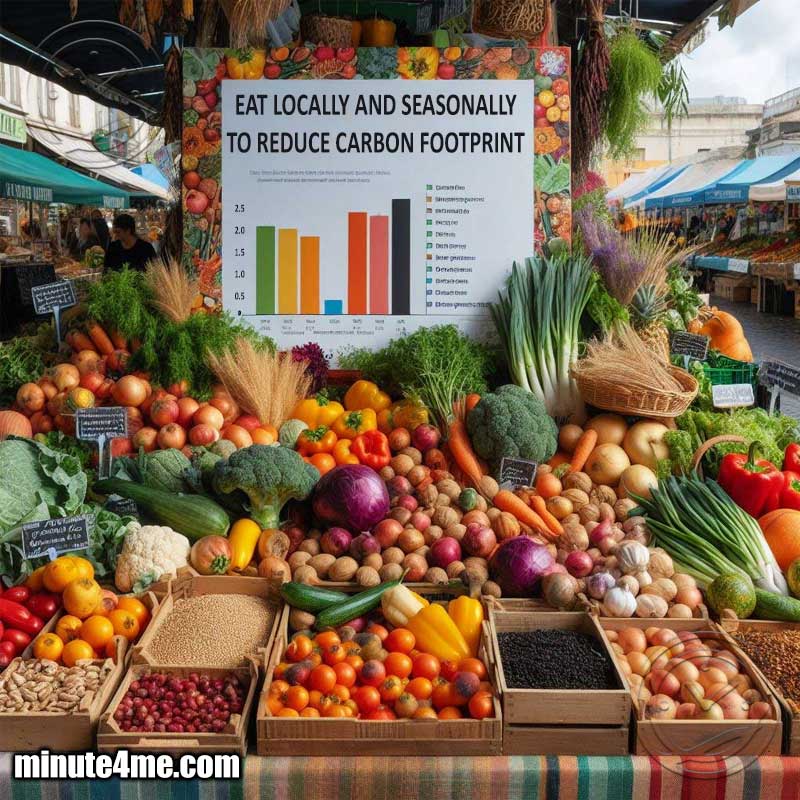Introduction
The Mediterranean diet, revered not only for its health benefits but also for its environmental sustainability and cultural significance, stands as a testament to a balanced and mindful approach to eating.
This diet, rich in fruits, vegetables, whole grains, legumes, and moderate amounts of fish and poultry, is not just a nutritional guideline but a lifestyle inherited from the Mediterranean region’s ancient cultural heritage.
Its sustainability is rooted in its low environmental impact, support for local economies, and promotion of social well-being.
This article embarks on a comprehensive exploration of the Mediterranean diet’s sustainability, scrutinizing its environmental, economic, and social facets, and offering insights into how it compares with other dietary patterns.
Is Mediterranean Diet Sustainable?
The sustainability of the Mediterranean diet is examined through its environmental, economic, and social lenses.
This diet is recognized for its low environmental impacts, richness in biodiversity, and high sociocultural food values, making it an exemplary model of a sustainable food system.
The diet’s foundation on plant-based foods, moderate consumption of animal protein, and emphasis on local and seasonal products contribute to its minimal ecological footprint.
Moreover, it supports local economies and promotes a healthy lifestyle, aligning with global sustainability targets.
Discover the transformative power of a vegan lifestyle! Embracing a diet that excludes all animal products, including meat, dairy, eggs,…
Environmental Benefits of the Mediterranean Diet
The Mediterranean diet’s environmental benefits are significant and multifaceted, rooted in its emphasis on plant-based consumption and responsible sourcing of animal products.
Here’s a detailed look at its environmental advantages:
- Lower Greenhouse Gas Emissions: Plant-based foods like fruits, vegetables, and grains have much lower emissions compared to red meat. This diet’s structure can considerably reduce one’s carbon footprint.
- Reduced Land and Water Use: By focusing on crops that are generally more efficient in terms of land and water use, the Mediterranean diet helps conserve vital environmental resources.
- Biodiversity Preservation: The diverse range of plant foods in the diet supports agricultural biodiversity, which is crucial for ecosystem resilience.
| Environmental Aspect | Benefit |
|---|---|
| Greenhouse Gas Emissions | Lower compared to diets high in red meat |
| Land Use | More efficient, conserving land |
| Water Use | Reduced, through emphasis on drought-resistant crops and efficient practices |
| Biodiversity | Supports agricultural diversity |
Economic and Social Advantages
The Mediterranean diet’s economic and social benefits are deeply interwoven with its environmental sustainability.
Its economic advantages include stimulating local economies through the support of local farmers and producers.
Socially, the diet fosters community cohesion and cultural identity by encouraging shared meals and traditional food practices.
- Local Economic Growth: By buying local and seasonal produce, consumers support the livelihoods of local farmers and contribute to the economic vitality of their communities.
- Cultural Preservation and Social Well-being: The diet’s emphasis on traditional foods and eating practices helps preserve cultural heritage and promotes social interaction and well-being.
Traditional Mediterranean Coffee: Flavors and Brands
Dive into the captivating world of traditional Mediterranean coffee flavors and brands with our guide. From the bold richness of…
Health Benefits and Sustainability
The health benefits of the Mediterranean diet are closely tied to its sustainability.
A balanced intake of nutrients, with a focus on plant-based foods and healthy fats like olive oil, contributes to reduced risks of chronic diseases such as heart disease, diabetes, and certain cancers.
The diet’s nutritional balance not only supports individual health but also contributes to a sustainable health system by potentially reducing the burden of diet-related diseases.
- Nutritional Balance: Rich in dietary fiber, vitamins, and minerals while being low in saturated fats and added sugars.
- Disease Prevention: Associated with lower risks of cardiovascular diseases, metabolic syndrome, and certain types of cancer.
Challenges to the Mediterranean Diet’s Sustainability
While the Mediterranean diet offers a blueprint for sustainable eating, it faces challenges that can impact its broad adoption and long-term sustainability.
Mediterranean Diet Frozen Dinners
Mediterranean diet frozen dinners – a life raft in the sea of your bustling day. This approach combines the time-saving…
Making the Mediterranean Diet More Accessible
Accessibility remains a significant challenge for the Mediterranean diet, influenced by geographic and economic factors.
Strategies to enhance accessibility include:
- Improving Supply Chains: Developing efficient supply chains can help make fresh, seasonal produce more widely available.
- Economic Incentives: Subsidies for local produce and incentives for sustainable farming practices can make healthy, sustainable food choices more affordable for consumers.
Reducing the Water Footprint
Although the Mediterranean diet generally requires less water compared to diets heavy in meat, the water footprint of agriculture, especially in water-scarce regions, is a concern.
Approaches to minimize water usage include:
- Water-Saving Agricultural Practices: Implementing drip irrigation and other water-efficient farming methods can reduce the water footprint of diet staples.
- Crop Selection: Encouraging the cultivation of native and drought-resistant crops can further decrease water usage.
Cultural Adaptations for Global Diets
Adapting the Mediterranean diet to suit various global cultures is essential for its broader acceptance and sustainability.
This involves integrating local food traditions and preferences with the Mediterranean diet’s core principles.
Cultural adaptation not only enhances the diet’s relevance across different regions but also encourages diversity in food consumption, which can lead to improved nutritional outcomes and environmental sustainability.
- Incorporation of Local Foods: Adapting the diet to include local fruits, vegetables, and protein sources can maintain its nutritional integrity while supporting local agriculture.
- Customization to Dietary Preferences: Modifying the diet to align with cultural dietary restrictions and preferences ensures wider acceptance and adherence.
- Education and Awareness: Promoting understanding of the diet’s principles through culturally relevant education can foster better adoption.
Comparative Analysis: Mediterranean vs. Other Diets
A comprehensive comparison between the Mediterranean diet and other popular diets highlights its sustainability and health benefits.
This analysis considers environmental impacts, nutritional content, and potential health outcomes.
Environmental Impact Comparison
The Mediterranean diet’s environmental footprint is compared with other dietary patterns to underscore its sustainability advantages.
| Diet Type | Greenhouse Gas Emissions | Water Usage | Land Use |
|---|---|---|---|
| Mediterranean | Low | Moderate | Low |
| High Red Meat | High | High | High |
| Vegan | Very Low | Low | Low |
| Vegetarian | Low | Moderate | Moderate |
- The Mediterranean diet has a lower environmental impact than high red meat diets, with benefits similar to vegetarian and vegan diets but offering more flexibility and nutritional diversity.
- Its moderate use of animal protein significantly reduces its overall environmental footprint, particularly in terms of greenhouse gas emissions and land use.
Health and Nutritional Comparison
Comparing the health benefits and nutritional profiles of the Mediterranean diet with other diets reveals its comprehensive approach to nutrition and disease prevention.
| Diet Type | Cardiovascular Health | Weight Management | Chronic Disease Risk |
|---|---|---|---|
| Mediterranean | Excellent | Good | Low |
| High Red Meat | Poor | Variable | High |
| Vegan | Good | Good | Variable |
| Vegetarian | Good | Good | Low-Moderate |
- The Mediterranean diet is associated with excellent cardiovascular health benefits and a lower risk of chronic diseases, such as type 2 diabetes and certain cancers, compared to diets high in red meat.
- It offers a balanced approach to weight management, with diverse nutritional intake ensuring a wide range of essential vitamins and minerals.
Actionable Tips for Adopting a Sustainable Mediterranean Diet
Adopting a sustainable Mediterranean diet involves mindful choices about food sourcing, preparation, and consumption.
Here are practical tips to embrace this diet sustainably.
Sourcing Local Ingredients
Sourcing local ingredients is key to following a sustainable Mediterranean diet.
Here are ways to incorporate local produce into your diet:
- Farmers’ Markets and CSAs: Purchase fresh produce from local farmers’ markets or join a Community Supported Agriculture (CSA) program to receive seasonal produce directly from farmers.
- Grow Your Own: Start a home garden to grow herbs and vegetables, even if it’s just in pots or window boxes.
- Seasonal Eating: Adapt your diet to include fruits and vegetables that are in season locally, reducing the need for imported goods.
Reducing Food Waste
Minimizing food waste is essential for a sustainable diet.
Implement these practices to reduce waste:
- Meal Planning: Plan meals ahead to buy only what you need, reducing excess purchases that might go to waste.
- Creative Leftovers: Transform leftovers into new meals instead of discarding them. For example, use vegetable scraps to make stock or turn yesterday’s roasted vegetables into a hearty frittata.
- Proper Food Storage: Learn how to store fruits and vegetables correctly to extend their freshness and usability.
Conclusion: The Future of Sustainable Eating
The Mediterranean diet not only presents a model for healthy eating but also for sustainable living.
Its low environmental impact, coupled with its economic and social benefits, makes it a viable option for those looking to adopt a more sustainable lifestyle.
As the world continues to grapple with climate change and sustainability challenges, diets like the Mediterranean offer a path forward, combining tradition with innovation to create a healthier planet and population.
The future of sustainable eating lies in our ability to embrace such diets, adapt them to our local contexts, and make mindful choices that benefit both our health and the environment.







